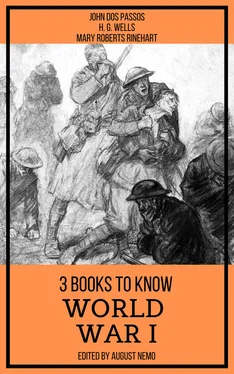“I'd like to see Indiana in the springtime,” said Andrews.
“Well you'll come out when the war's over and us guys is all home... won't you, Andy?”
“You bet I will.”
They were going into the suburbs of a town. Rows and clusters of little brick and stucco houses were appearing along the roads. It began to rain from a sky full of lights of amber and lilac color. The slate roofs and the pinkish-grey streets of the town shone cheerfully in the rain. The little patches of garden were all vivid emerald-green. Then they were looking at rows and rows of red chimney pots over wet slate roofs that reflected the bright sky. In the distance rose the purple-grey spire of a church and the irregular forms of old buildings. They passed through a station.
“Dijon,” read Andrews. On the platform were French soldiers in their blue coats and a good sprinkling of civilians.
“Gee, those are about the first real civies I've seen since I came overseas,” said Judkins. “Those goddam country people down at Polignac didn't look like real civilians. There's folks dressed like it was New York.”
They had left the station and were rumbling slowly past interminable freight trains. At last the train came to a dead stop.
A whistle sounded.
“Don't nobody get out,” shouted the sergeant from the car ahead.
“Hell! They keep you in this goddam car like you was a convict,” muttered Chrisfield.
“I'd like to get out and walk around Dijon.”
“O boy!”
“I swear I'd make a bee line for a dairy lunch,” said Judkins.
“Hell of a fine dairy lunch you'll find among those goddam frogs. No, vin blank is all you'ld get in that goddam town.”
“Ah'm goin' to sleep,” said Chrisfield. He stretched himself out on the pile of equipment at the end of the car. Andrews sat down near him and stared at his mud-caked boots, running one of his long hands, as brown as Chrisfield's now, through his light short-cut hair.
Chrisfield lay looking at the gaunt outline of Andrews's face against the light through half-closed eyes. And he felt a warm sort of a smile inside him as he said to himself: “He's a damn good kid.” Then he thought of the spring in the hills of southern Indiana and the mocking-bird singing in the moonlight among the flowering locust trees behind the house. He could almost smell the heavy sweetness of the locust blooms, as he used to smell them sitting on the steps after supper, tired from a day's heavy plowing, while the clatter of his mother's housework came from the kitchen. He didn't wish he was back there, but it was pleasant to think of it now and then, and how the yellow farmhouse looked and the red barn where his father never had been able to find time to paint the door, and the tumble-down cowshed where the shingles were always coming off. He wondered dully what it would be like out there at the front. It couldn't be green and pleasant, the way the country was here. Fellows always said it was hell out there. Well, he didn't give a damn. He went to sleep.
He woke up gradually, the warm comfort of sleep giving place slowly to the stiffness of his uncomfortable position with the hobnails of a boot from the back of a pack sticking into his shoulder. Andrews was sitting in the same position, lost in thought. The rest of the men sat at the open doors or sprawled over the equipment.
Chrisfield got up, stretched himself, yawned, and went to the door to look out. There was a heavy important step on the gravel outside. A large man with black eyebrows that met over his nose and a very black stubbly beard passed the car. There were a sergeants stripes on his arm.
“Say, Andy,” cried Chrisfield, “that bastard is a sergeant.”
“Who's that?” asked Andrews getting up with a smile, his blue eyes looking mildly into Chrisfield's black ones.
“You know who Ah mean.”
Under their heavy tan Chrisfield's rounded cheeks were flushed. His eyes snapped under their long black lashes. His fists were clutched.
“Oh, I know, Chris. I didn't know he was in this regiment.”
“God damn him!” muttered Chrisfield in a low voice, throwing himself down on his packs again.
“Hold your horses, Chris,” said Andrews. “We may all cash in our checks before long... no use letting things worry us.”
“I don't give a damn if we do.”
“Nor do I, now.” Andrews sat down beside Chrisfield again.
After a while the train got jerkily into motion. The wheels rumbled and clattered over the rails and the clots of mud bounced up and down on the splintered boards of the floor. Chrisfield pillowed his head on his arm and went to sleep again, still smarting from the flush of his anger.
Andrews looked out through his fingers at the swaying black box car, at the men sprawled about on the floor, their heads nodding with each jolt, and at the mauve-grey clouds and bits of sparkling blue sky that he could see behind the silhouettes of the heads and shoulders of the men who stood in the doors. The wheels ground on endlessly.
The car stopped with a jerk that woke up all the sleepers and threw one man off his feet. A whistle blew shrilly outside.
“All right, out of the cars! Snap it up; snap it up!” yelled the sergeant.
The men piled out stiffly, handing the equipment out from hand to hand till it formed a confused heap of packs and rifles outside. All down the train at each door there was a confused pile of equipment and struggling men.
“Snap it up.... Full equipment.... Line up!” the sergeant yelled.
The men fell into line slowly, with their packs and rifles. Lieutenants hovered about the edges of the forming lines, tightly belted into their stiff trench coats, scrambling up and down the coal piles of the siding. The men were given “at ease” and stood leaning on their rifles staring at a green water-tank on three wooden legs, over the top of which had been thrown a huge piece of torn grey cheesecloth. When the confused sound of tramping feet subsided, they could hear a noise in the distance, like someone lazily shaking a piece of heavy sheet-iron. The sky was full of little dabs of red, purple and yellow and the purplish sunset light was over everything.
The order came to march. They marched down a rutted road where the puddles were so deep they had continually to break ranks to avoid them. In a little pine-wood on one side were rows of heavy motor trucks and ammunition caissons; supper was cooking in a field kitchen about which clustered the truck drivers in their wide visored caps. Beyond the wood the column turned off into a field behind a little group of stone and stucco houses that had lost their roofs. In the field they halted. The grass was brilliant emerald and the wood and the distant hills were shades of clear deep blue. Wisps of pale-blue mist lay across the field. In the turf here and there were small clean bites, that might have been made by some strange animal. The men looked at them curiously.
“No lights, remember we're in sight of the enemy. A match might annihilate the detachment,” announced the lieutenant dramatically after having given the orders for the pup tents to be set up.
When the tents were ready, the men stood about in the chilly white mist that kept growing denser, eating their cold rations. Everywhere were grumbling snorting voices.
“God, let's turn in, Chris, before our bones are frozen,” said Andrews.
Guards had been posted and walked up and down with a business-like stride, peering now and then suspiciously into the little wood where the truck-drivers were.
Chrisfield and Andrews crawled into their little tent and rolled up together in their blankets, getting as close to each other as they could. At first it was very cold and hard, and they squirmed about restlessly, but gradually the warmth from their bodies filled their thin blankets and their muscles began to relax. Andrews went to sleep first and Chrisfield lay listening to his deep breathing. There was a frown on his face. He was thinking of the man who had walked past the train at Dijon. The last time he had seen that man Anderson was at training camp. He had only been a corporal then. He remembered the day the man had been made corporal. It had not been long before that that Chrisfield had drawn his knife on him, one night in the barracks. A fellow had caught his hand just in time. Anderson had looked a bit pale that time and had walked away. But he'd never spoken a word to Chrisfield since. As he lay with his eyes closed, pressed close against Andrew's limp sleeping body, Chrisfield could see the man's face, the eyebrows that joined across the nose and the jaw, always blackish from the heavy beard, that looked blue when he had just shaved. At last the tenseness of his mind slackened; he thought of women for a moment, of a fair-haired girl he'd seen from the train, and then suddenly crushing sleepiness closed down on him and everything went softly warmly black, as he drifted off to sleep with no sense but the coldness of one side and the warmth of his bunkie's body on the other.
Читать дальше












